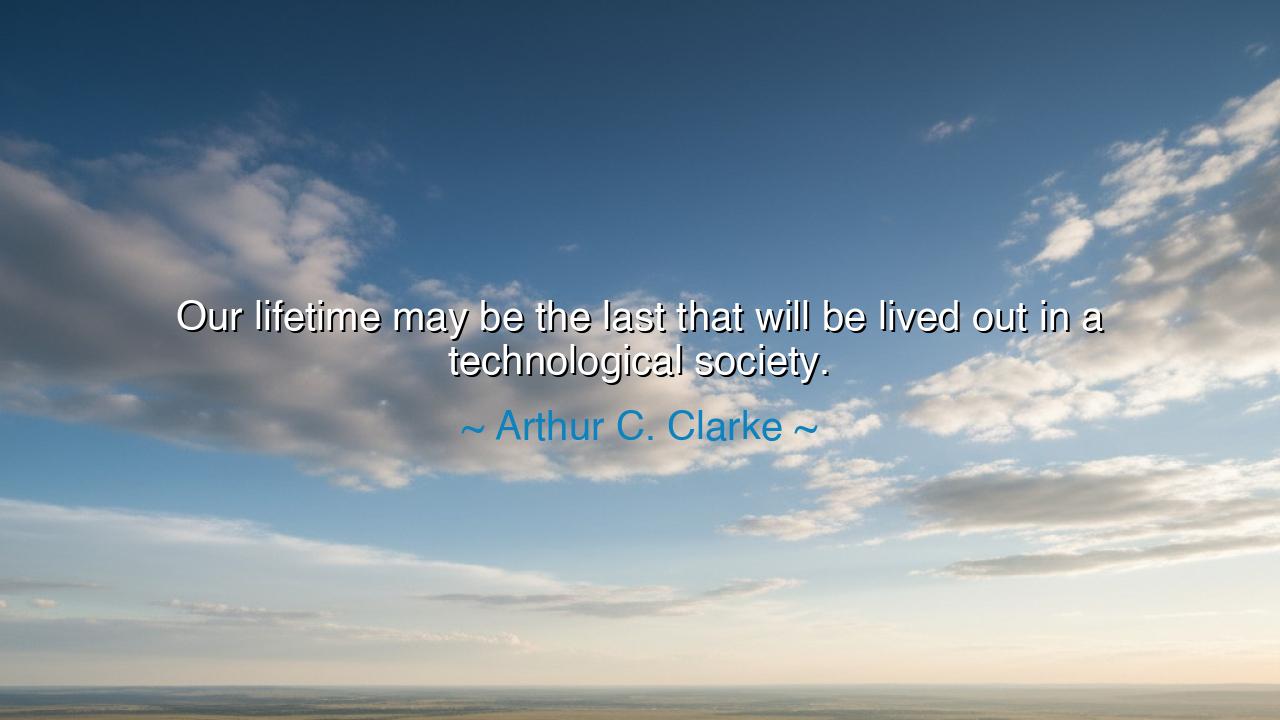
Our lifetime may be the last that will be lived out in a






The words of Arthur C. Clarke, “Our lifetime may be the last that will be lived out in a technological society,” are not mere speculation but prophecy—at once wondrous and ominous. Clarke, the great seer of the modern age, whose imagination gave us visions of satellites, space travel, and artificial intelligence, here reflects upon the fragility of our civilization. What he names is the possibility that the very technological society which has lifted humankind to undreamt heights might also prove to be a fleeting chapter, fragile before forces of destruction or transformation. His words hang like a bell at the edge of time, asking us: will this age endure, or will it vanish?
The origin of this thought lies in the paradox of technology itself. Clarke lived through the atomic age, when humanity split the atom and created the power to either light entire cities or erase them in fire. He saw the rise of computers, capable of solving mysteries and creating knowledge—but also of enslaving through surveillance and control. To him, a technological society was both humanity’s greatest triumph and its most delicate experiment. For while tools can extend our reach, they also magnify our errors; and while machines can build, they can also destroy. Clarke’s words remind us that our lifetimes may be perched upon the knife-edge between wonder and ruin.
History gives us many warnings of civilizations that believed their greatness eternal, yet crumbled when their foundations failed. Consider Rome, whose roads, aqueducts, and engineering seemed invincible. Yet its power waned, not from lack of genius, but from corruption, division, and overreach. Its monuments still stand, but its society fell. Or look to the Maya, who built pyramids and studied the stars, but whose fragile environment, once exhausted, could no longer sustain them. Clarke warns that our technological civilization may follow the same path—not because our machines are weak, but because our wisdom may not keep pace with our power.
And yet, Clarke’s voice is not only warning but also invitation. For just as a society may collapse, so too may it ascend to greater heights. He envisioned futures where humanity spreads among the stars, guided by science and united by reason. The end of our technological age, in his view, could mean not only destruction but also transformation—a crossing into a higher form of existence, whether through spacefaring civilizations, artificial intelligence, or even new forms of consciousness. Thus, the prophecy cuts two ways: our lifetime may be the last in this familiar society, but what comes after may be greater still—or nothing at all.
The meaning of his words, then, is that the fate of technology is inseparable from the fate of humanity itself. If we wield it blindly, we risk ending not only our age but ourselves. If we wield it wisely, we may step into futures beyond imagination. A technological society is not self-sustaining; it requires vigilance, wisdom, and restraint to endure. It is not the machines that will determine survival, but the spirit of the people who build and guide them.
The lesson for us is profound: we must not take for granted the miracle of our age. To live with satellites overhead, medicine that conquers disease, and machines that bring the voices of the world into our hands—this is not ordinary, but extraordinary. It may not last. We must therefore treat it as a sacred trust. Every choice—whether to build weapons or schools, whether to exploit the earth or to renew it, whether to divide nations or unite them—shapes whether our technological society endures or ends.
Practical actions stand before us like crossroads. Support science not only as innovation, but as stewardship. Use technology not to dominate, but to serve humanity. Teach children not only to use machines, but to question their purpose and their consequences. Demand from leaders foresight, not short-term gain. And in your own life, balance wonder with wisdom—embrace technology, but never forget the ancient virtues of compassion, humility, and justice.
Thus let Clarke’s words be remembered as both warning and vision: our lifetime may be the last lived in this form of society. It may end in collapse, or it may be transformed into something higher. The choice is not fate’s alone—it is ours. And if we remember this truth, perhaps the age of technology will not be the last, but the beginning of humanity’s greatest journey.






AAdministratorAdministrator
Welcome, honored guests. Please leave a comment, we will respond soon